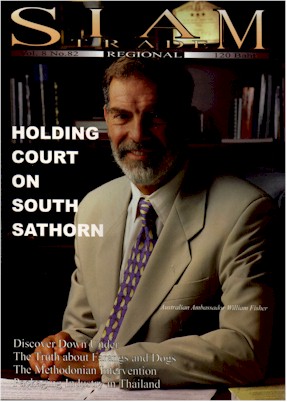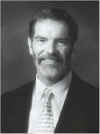HOLDING COURT ON SOUTH SATHORN
by
William Fisher - Australian AmbassadorWilliam Fisher is a happy man. Speaking from his country's third largest foreign mission, the Australian ambassador to Thailand says he has the most sought after position in the Australian foreign service. Indeed, he says that when you get posted to Thailand it's like winning the lottery. Ambassador Fisher says that the Thai people are so friendly and welcoming, and the Thai culture is so interesting: "You feel as though you really can become a part of people's families and lives here in a way that you cannot in so many other countries."
"There are a huge range of activities between our two countries," says the Ambassador. "We have a very active political and trade relationship and we have always had an active aid program in Thailand (now US$22 million a year). Here at the embassy we have an Education Center where Thai students and their parents can come to find out more about educational programs and facilities in Australia (About 30,000 Thais have studied at Australiam educational institutions.)
"Thailand has always been a popular destination for Australian tourists but with the new economic circumstances that has increased by twenty-five percent. The presence of Australian investors here is also quite large. On the defense side, we have a mutually beneficial defense relationship with the Royal Thai Armed Forces that covers almost every facet of their activities. (The day Siam Trade interviewed the ambassador, he was presenting full post-graduate scholarships to thirteen Thai military officers, and Thai Army Commander-in-Chief General Surayud Chulanont was in attendance.) We also have a large federal police unit here at the embassy which works closely with the Thai police in many areas, particularly fighting drug trafficking."
It has been said that it is extremely frustrating being an ambassador because one must always watch what one says. How does Ambassador Fisher think about this? "I never feel frustrated, but to the despair of my colleagues I usually say what I think. Sometimes I might not say all of what I think, but I don't think I've ever been in the position to seriously reign myself in."
What about Pauline Hanson? "The Australian Government firmly repudiated what Pauline was putting forward, and we had to keep saying that. We had to remind people that this was not a majority view in Australia, she only had about six or seven percent in the public opinion polls, so don't exaggerate this too much.
"However, if I had been a Thai citizen, living in Bangkok glancing at the news every once in a while, I would have also thought that Pauline Hanson was taking Australia by storm. I think the media made so much out of this because it was the first piece of interesting political news out of Australia since Gough Whitlam's government was dismissed back in 1975. But the One Nation movement got much more prominence than a tiny movement with six or seven percent of the popular support deserved. It was a little movement making a lot of noise."
How have trade relations changed because of the economic crisis, and what goods are going back and forth? "Thai exports to Australia have increased tremendously, so much so that what in the past was a trade deficit for the Thais is now a trade surplus. Seafood is their biggest export to us, followed by other foodstuffs and then machinery, car parts, computer parts, and telecommunications systems. For our part, we send a lot of aluminum, gold, dairy products, and wheat to Thailand. Australian cotton and wool are also significant imports to this country because they are used in the Thai textile industry to manufacture items for export.
"Australia provided US$1 billion of the IMF bail-out package to Thailand. We have also lowered our tariffs to Thailand from seven to eight percent five years ago to about five percent right across the board today. The main agenda for APEC right now is trade liberalization and tariff reduction, and Australia has played a major role in this regard."
When Thais go Downunder where are they going, and have tourist arrivals from Thailand dropped off considerably? "Thais going to Australia tend to go to Sydney, Melbourne, Perth, and the Gold Coast. They like to visit animal parks, play golf and spend time in clean and safe cities. Yes, unfortunately, because of the crisis Thai tourism to Australia is down by more than thirty percent. I would like to point out though that Thais give our embassy lots of compliments when it comes to the speed and friendliness of the service we offer when issuing visas."
What other initiatives are you working on to try and increase trade, or foster better relations between your two countries? "Well, we recently signed an MoU in agriculture co-operation. We hosted a visit by the Thai Agriculture Minister Pongpol Adireksam earlier in the year, and we are trying to co-operate with the Thais in accessing third markets for tropical fruits e.g. Thailand produces mangoes for eight months of the year, and Australia produces mangos for the other four months of the year, so if we combine forces, we can produce mangos year round. Thailand is also trying to improve its livestock for export by improving the quality of its feedstock, and it is undertaking a study on the nutritional benefits of Australian lupins, a very nutritious food source for livestock.
"We also see a particular niche for Australian component suppliers to supply big car manufacturers here in Thailand. We have recently seen the globalization of the car market. You don't produce a car in Detroit and export it to Brazil. You produce parts for a model of car all over the world, and then you export that model of car all over the world. We used to export Australian cars to Thailand, now we are more likely to export component parts of various cars to various manufacturers in Thailand who in turn will export their cars to markets in Europe or South America.
"For the Asian Games we have put forth a big effort in helping Thailand field a more competitive team. Currently, our national swim coach, Bill Sweetenhan, is here helping Thai swimmers. We also have four coaches working with the Thai equestrian team, and another coach helping out with the cycling team. The Thai boxing team was training in Australia, as was the Thai rugby team.
"Qantas is also the largest user of Don Muang Airport apart from Thai Airways. It is a hub for our national carrier and we now have seventy-seven flights a week going from Bangkok to Australia. This is also a major investment in the Thai economy because as you can imagine Qantas, its passengers and crew spend a lot of money here.
"And, as the Thai military currently doesn't have the cash for joint-military exercises we have been sending troops, planes and ships here at our expense."
How has Australia been affected by the economic crisis? "The Asian economic crisis coincided with a period of strong domestic demand in Australia which gave way to cheaper imports and an imbalance of trade which created a current account deficit which caused our dollar to depreciate against the US dollar. But our rate of growth has still been high."
BACKGROUND DATA
Ambassador Fisher joined the Australian Department of Foreign Affairs back in 1968. The next year he was posted to Geneva where he became the embassy's second secretary. In 1972, he moved on to be the first secretary at the Australian mission in Vientiane. He then went back to Canberra for a couple of years to work for the Department of Foreign Affairs and Trade. In 1975, he was dispatched to Noumea, New Caledonia as the Australian Consul General.
In 1978, he was off again, still as Consul General but this time to Vila in the New Hebrides. In 1980, he returned to Canberra to once again work for the Department of Foreign Affairs and Trade.
He was then off to the Middle East as the Australian Charge D'Affairs in Tehran, Iran from 1982-83. From 1983-87, he was the Consul-General in Honolulu (also covering Micronesia). It was back to Canberra after that to serve as an Assistant Secretary of Defense, and then as an Assistant Secretary of the Executive Branch. In 1989, he was made the Principal Adviser for the Americas and European Division of Australia's Department of Foreign Affairs.
In 1990, he received his first posting as ambassador as he became his country's ambassador in Israel. He stayed until 1993 when he was brought back to Canberra to be the First Assistant Secretary for the International Organizations and Legal Division of the Department of Foreign Affairs and Trade and then he held a similar position with the consular Programs and Security Division, before being named ambassador to Thailand earlier this year.
*******
AUSTRALIANS YOU SHOULD KNOW ABOUT
* Rupert Murdoch - tycoon
* Pat Cash - tennis player
* Patrick Rafter " "
* Mark Philippoussis " "
* Mark Woodeford " "
* Yvonne Goolagong - ex-tennis player
* John Newcombe " "
* Rod Laver " "
* Greg Norman - golfer
* Mark Taylor - cricket
* Ian Thorpe - swimmer
* Michael Klimm "
* Suzie O'Neil "
* Kieran Perkins "
* Daniel Kowalski "
* Steve Kerr - basketball player
* Graeme Lloyd - baseball player
* McFarland Burnett - scientist
* Howard Florey - pathologist
* John Eccles - 97 Nobel Prize winner for Medicine
* Dame Joan Sutherland - diva
* Richard Murphy - ballet dancer
* Peter Weir - film director
* Nicole Kidman - actress
* Olivia Newton John "
* Bryan Brown - actor* Paul Hogan "
* Mel Gibson "
* Geoffrey Rush "
* Peter Garrett (& Midnight Oil) - musicians
* INXS "
* Kylie Minogue "
* Air Supply "
* Tina Arena "
* Peter Carey - author
* Thomas Keneally "
* Jim Wolfensohn - President of the World Bank
* Herbert vere Eratt - Leader of the Labor Party, High Court Judge & President of the UN General Assembly (1948-9)
Finis


